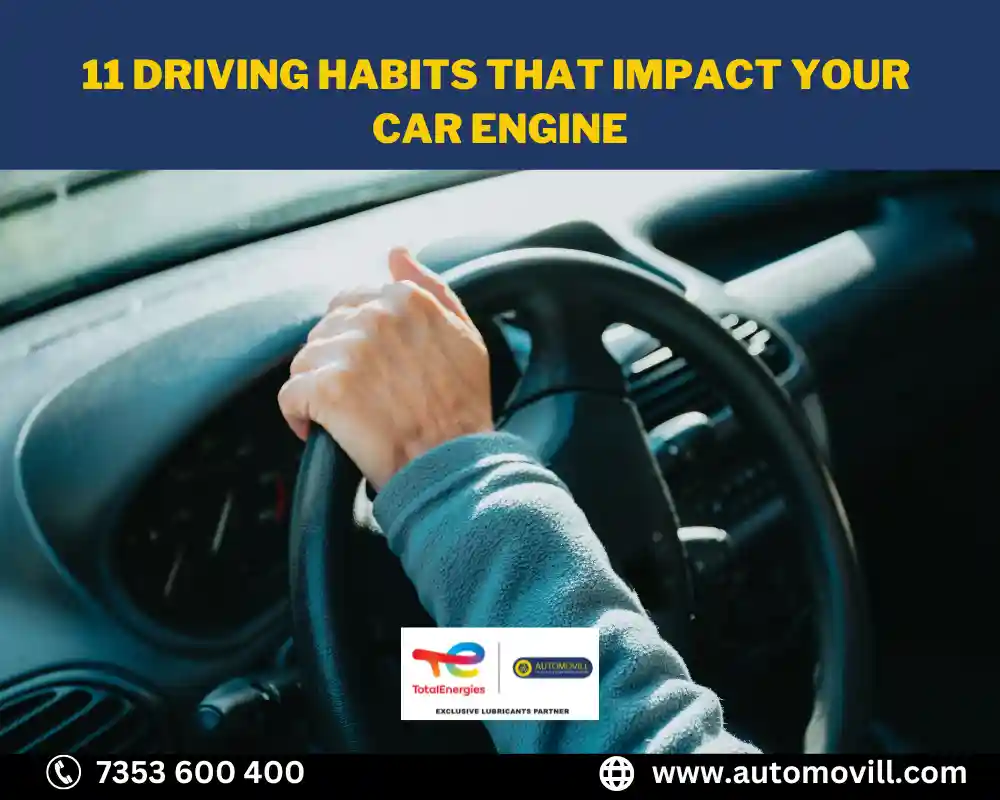
As a car owner, maintaining the health of your car engine should be a top priority. However, some of our everyday driving habits unknowingly contribute to engine wear and tear and reduce longevity.
Let’s explore some common driving habits that can affect your car engine:
11 Driving Habits that might damage your Car Engine
Here we go:
1. Aggressive Driving
Frequent aggressive driving, such as rapid acceleration, sudden braking, and speeding, puts a lot of stress on the engine. This leads to reduced fuel efficiency and even damage to engine components over time.
2. Ignoring Warm-Up Time
Driving your car hard immediately after a cold start can be detrimental to the engine. Engines need a few moments to warm up and allow the oil to circulate properly. Gentle driving during the warm-up period is recommended.
3. Riding the Clutch
For manual transmission cars, resting your foot on the clutch pedal while driving causes unnecessary friction and wear on the clutch, affecting the engine’s performance and fuel efficiency. Only use the clutch when changing gears.
4. Overloading the Vehicle
If you carry excessive weight in your car, not only the engine has to work harder to move the extra weight, leading to premature wear but also impacts fuel efficiency.
5. Running on Low Fuel
Driving your car on low fuel levels may cause the fuel pump to suck in the air, which can lead to fuel system issues and potential damage to the engine.
6. Using the Wrong Gear
Driving in the wrong gear, such as driving at low speeds in a higher gear or vice versa, can strain the engine and decrease fuel efficiency. Use the appropriate gear for the driving conditions.
7. Frequent Short Trips
Engines operate most efficiently when they reach their optimal operating temperature. Frequent short trips prevent the engine from warming up fully and can lead to increased fuel consumption and engine wear.
8. Engine Over-revving
Revving the engine excessively, especially when the engine is cold, can cause stress on engine components and may lead to engine damage over time.
9. Using the Air Conditioning Unnecessarily
Using air conditioning excessively can increase the engine load and reduce fuel efficiency. Whenever possible, use the car’s ventilation system instead of the AC.
10. Ignoring Unusual Sounds or Warning Lights
Strange engine noises or warning lights should not be ignored. These can be early signs of potential engine issues that, if addressed promptly, can prevent further damage.
11. Driving on Rough Roads
Frequent driving on rough and uneven roads and even with high speed can lead to increased stress on the engine mounts and suspension, affecting the engine’s stability and performance.
FAQ
1) Does driving slow damage your engine?
No, driving slow does not inherently damage your engine. In fact, driving at a moderate and consistent speed can be beneficial for your engine’s health, especially during the warm-up phase. Gentle driving allows the engine to warm up gradually, allowing the oil to circulate and lubricate engine components properly.
However, driving too slowly for prolonged periods, such as constant idling or crawling in traffic, can result in incomplete combustion and carbon buildup, which may negatively impact engine performance and fuel efficiency over time.
2) Does driving on high gear damage the car?
Driving in high gear, such as using a higher gear at low speeds or uphill, can strain the engine and potentially damage it. When the engine is forced to operate at a lower RPM (Revolutions Per Minute) in a higher gear, it may struggle to deliver the required power, causing stress on engine components. This strain can lead to reduced fuel efficiency, increased engine wear, and even overheating in extreme cases. It’s essential to use the appropriate gear for the driving conditions to ensure the engine operates efficiently.
3) Does low RPM increase mileage?
Yes, driving at low RPM can increase fuel mileage. Lower RPM means the engine is rotating at a slower rate, resulting in less fuel consumption. Modern car engines are designed to be most fuel-efficient in a specific RPM range, typically at lower RPMs during steady cruising speeds.
Driving at lower RPMs also reduces the stress on engine components, which can contribute to better engine longevity. However, it’s important to find the right balance, as driving at extremely low RPMs, such as lugging the engine, can be harmful and lead to reduced fuel efficiency and potential engine damage.
Conclusion
Adopting good driving habits, shifting the right gear at the right speed, not stressing clutch much and maintaining a balance between RPM and speed can help promote better engine health and fuel efficiency, leading to a more enjoyable and cost-effective driving experience.
Regular maintenance and attentive driving go hand in hand with ensuring your car’s engine stays in top-notch condition for years to come.
